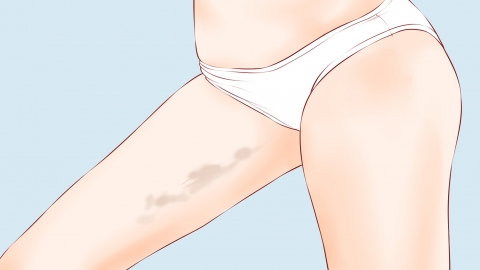Why is my inner thigh itchy and has a dark scar?
Generally speaking, itching refers to pruritus. Itching on the inner thigh accompanied by a dark scar may be caused by skin friction, sweat accumulation, tinea cruris (jock itch), eczema, neurodermatitis, or other reasons. If discomfort occurs, timely medical consultation is recommended. Detailed analysis is as follows:

1. Skin Friction
The skin on the inner thigh may become irritated due to clothing friction or body movement, potentially causing itching. Prolonged friction may also lead to pigmentation, forming a dark scar. It is recommended to wear loose, breathable clothing to reduce skin friction; maintain personal hygiene and change underwear regularly.
2. Sweat Accumulation
The inner thigh area contains numerous sweat glands, and sweat accumulation can easily foster bacterial growth, causing itching. Long-term sweat irritation may also result in skin pigmentation. Keeping the skin clean and dry, showering frequently, and wearing absorbent clothing and bedding are recommended.
3. Tinea Cruris (Jock Itch)
Tinea cruris is caused by fungal infection and commonly occurs in warm, moist environments. When fungi infect the skin, they may cause itching and pigmentation, resulting in dark scars. Symptoms such as redness and papules may also appear. Under a doctor's guidance, antifungal medications such as clotrimazole cream, ketoconazole cream, or terbinafine hydrochloride cream may be used for treatment.
4. Eczema
Eczema may be related to genetic, allergic, or environmental factors, and may cause skin inflammation leading to itching. Long-term inflammation may also cause pigmentation, accompanied by symptoms such as exudation and crusting. Patients may use medications such as hydrocortisone cream, desonide cream, or mometasone furoate cream under medical supervision.
5. Neurodermatitis
Neurodermatitis may be closely related to mental and neurological factors, such as anxiety or stress. Stimulation of cutaneous nerve endings causes itching, and chronic scratching leads to pigmentation. Symptoms such as thickened skin and lichenification may also occur. Patients may use medications such as diazepam tablets, loratadine capsules, or cetirizine hydrochloride tablets under a doctor's guidance.
Maintaining personal hygiene, showering regularly, and keeping the skin clean and dry are important. Additionally, choosing appropriate clothing to reduce skin friction is recommended.






